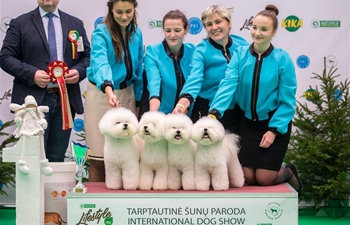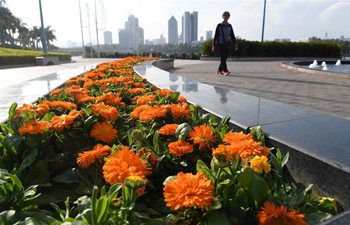LANZHOU, Dec. 28 (Xinhua) -- In a field of Gansu Kangyuan Modern Agricultural Co., Ltd. in northwest China's Gansu Province, piles of earthworms wriggle among the fodder made of discarded vegetables.
"We made the unwanted vegetables into fodder and the worms consume them," said company deputy general manager Wang Gang. Located in Gansu's Yuzhong County, the company churns out a huge number of fresh vegetables to be sold across China and is one of the biggest companies in the region.
The earthworms are alleviating a major headache for locals as China's poverty-relief campaign gains steam.
The rotten vegetables come from the burgeoning highland vegetable industry in the county, which the government encouraged with subsidies to help locals out of poverty.
As the industry grows, so does the glut of undesirable, leftover vegetable scraps, including some inedible roots, incomplete leaves, and leaves damaged during transportation. Some parts also need to be peeled off before the vegetables hit the shelves in markets.
However, the unwanted scraps are very difficult to dispose of. They require a lot of resources and costs are usually quite high, according to Wang.
"The earthworms truly handled a hard nut to crack for us," Wang said.
Currently, the company raises 0.7 hectares of earthworms, but it plans to increase the scale.
VEGETABLES GROW ON POVERTY
Despite years of prosperity in the coastal regions, pockets of residents still lag behind in China's underdeveloped rural areas, which poses a challenge for the country in its battle to wipe out absolute poverty by 2020.
In 2012, China had 98.99 million rural people living under the national poverty line of 2,300 yuan (329 U.S. dollars) in annual income. By the end of 2018, the number had dropped by 82.4 million, leaving 16.6 million still living in poverty.
For residents in the dry, mountainous Yuzhong County, life has been hard due to a lack of resources. Many generations have led impoverished lives.
But the county has a great advantage: it stands about 2,000 meters above sea level, and is perfect for vegetable cultivation, thanks to the large swing in temperatures from day to night, long daylight hours and a dearth of pests.
To help lift locals out of poverty, the government encouraged them to grow highland vegetables and provided subsidies. They also called on people in coastal areas such as the northern Tianjin Municipality to buy the vegetables from farmers.
The measures gave rise to an expanding vegetable industry and lifted many out of poverty. But they also produced a lot of undesirable vegetable scraps. One tonne of vegetables can create 0.3 tonnes of useless vegetable scraps, according to Wang.
"The disposal of the useless vegetable scraps has troubled people here for quite some time," Wang Gang said. "We have tried a variety of ways, but the results were less than satisfactory."
EARTHWORMS TO THE RESCUE
Just when locals were scratching their heads over the situation, the wriggling earthworms came to the rescue.
Last year, an earthworm-raising company sent a representative to Yuzhong County for a field survey, and suggested using tubular worms to consume the vegetable leftovers.
"We thought it would be a good idea, and purchased a batch of earthworms from them this May for a trial," Wang said.
The leftovers were made into fermented fodder with some organics and proved to be popular with the worms.
"It has been quite efficient," Wang said. "We finally found a way to get rid of the leftovers effectively."
The worms not only generated environmental value but also brought economic benefits. According to Wang, his company managed to extract protein from the earthworms to make healthcare products.
"For each mu (one mu equals 0.07 hectares) of earthworms, we can get a production value of about 30,000 yuan, even more profitable than growing vegetables," Wang said.
The company will purchase more earthworms next year, Wang added.
"We will also raise chickens next year, which feed on the worms, so that we can create a virtuous circle among the vegetables, earthworms and chickens," he said.

















